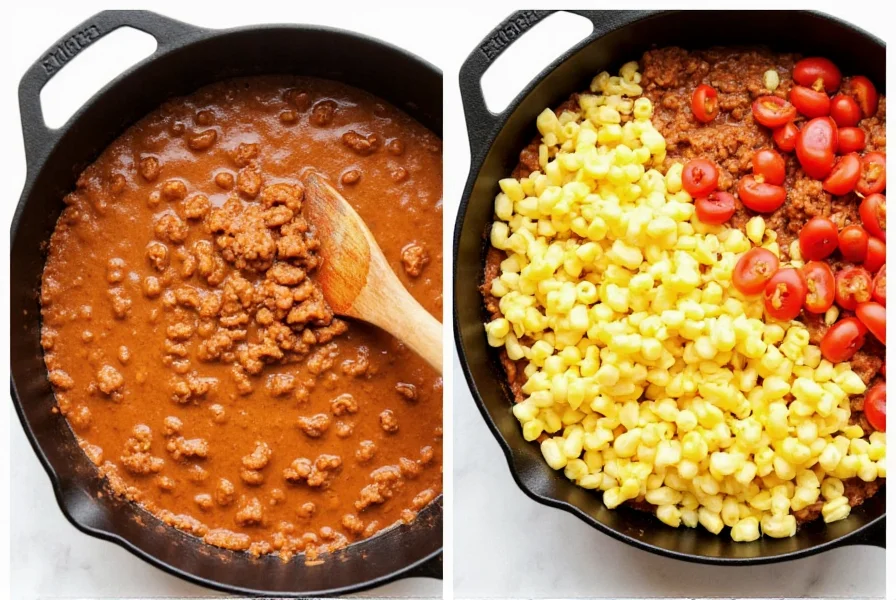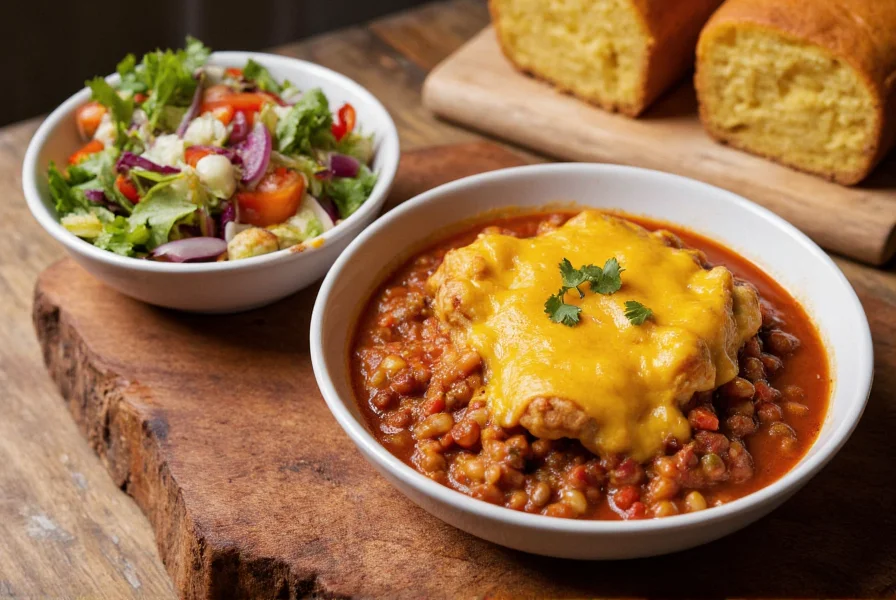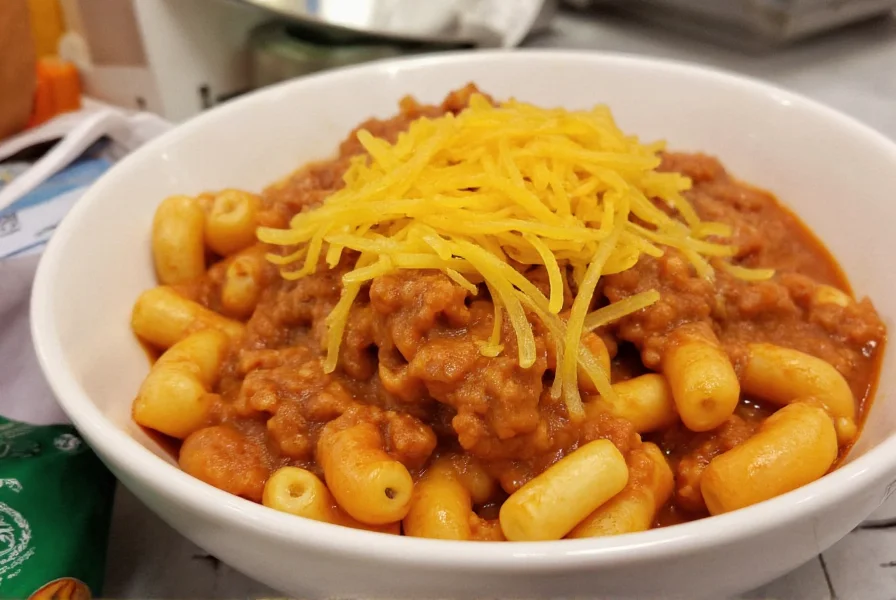Originating as a clever way to stretch limited ingredients during economic hardships, chili mac and cheese has evolved from humble beginnings into a beloved comfort food classic. This hearty casserole perfectly balances the creamy richness of traditional macaroni and cheese with the bold, spicy flavors of chili con carne. Whether you're preparing it for a weeknight dinner, potluck gathering, or game day spread, understanding the essential components and techniques will help you create the perfect version every time.
The Essential Components of Perfect Chili Mac and Cheese
Creating exceptional chili mac and cheese requires attention to three critical elements: the pasta base, cheese sauce, and chili topping. Each component contributes unique textures and flavors that, when balanced correctly, create a harmonious dish greater than the sum of its parts.
| Component | Key Characteristics | Recommended Variations |
|---|---|---|
| Pasta Base | Al dente elbow macaroni or cavatappi | Gluten-free pasta, whole wheat pasta |
| Cheese Sauce | Sharp cheddar base with creaminess enhancers | Gouda-cheddar blend, pepper jack for heat |
| Chili Topping | Meat-based with balanced spice profile | Vegetarian bean chili, turkey chili option |
Step-by-Step Preparation Guide
Follow these professional techniques to achieve restaurant-quality chili mac and cheese at home. The key to success lies in proper timing and layering of flavors.
Pasta Preparation
Cook 1 pound of elbow macaroni in well-salted boiling water until just shy of al dente (about 7-8 minutes). The pasta will continue cooking when combined with the hot cheese sauce and chili. Drain thoroughly but don't rinse, as the starch helps the cheese sauce adhere properly.
Crafting the Perfect Cheese Sauce
While the pasta cooks, create a roux using 3 tablespoons butter and 3 tablespoons all-purpose flour over medium heat. Cook for 1-2 minutes until golden, then gradually whisk in 2 cups whole milk until smooth. Bring to a gentle simmer, then reduce heat to low and gradually add 3 cups shredded sharp cheddar cheese, stirring constantly until melted. For extra creaminess, incorporate ½ cup cream cheese and ¼ cup grated Parmesan. Season with ½ teaspoon mustard powder, ¼ teaspoon garlic powder, salt, and white pepper to taste.
Chili Component
For the classic meat version, brown 1 pound ground beef with 1 diced onion and 2 minced garlic cloves. Drain excess fat, then add 1 (15-ounce) can kidney beans (drained), 1 (15-ounce) can diced tomatoes, 1 (8-ounce) can tomato sauce, 2 tablespoons chili powder, 1 teaspoon cumin, ½ teaspoon smoked paprika, and salt to taste. Simmer for 15-20 minutes to develop flavors.
Expert Tips for Flavor Enhancement
Professional chefs recommend several techniques to elevate your homemade chili mac and cheese:
- Add acid - A splash of apple cider vinegar or squeeze of lime juice brightens the rich flavors
- Layer textures - Mix smooth and shredded cheeses for varied mouthfeel
- Toast spices - Briefly toast chili powder and cumin before adding to chili
- Finish with freshness - Top with chopped scallions or cilantro before serving

Variations for Different Dietary Preferences
Chili mac and cheese adapts beautifully to various dietary needs without sacrificing flavor. These modifications maintain the essence of the dish while accommodating different requirements:
Vegetarian Chili Mac and Cheese
Replace the meat with a combination of black beans, pinto beans, and lentils. Add 1 diced bell pepper and 1 cup corn kernels to the chili component for extra texture. For umami depth, include 1 tablespoon soy sauce or liquid smoke in the chili mixture.
Spicy Chipotle Version
For those who enjoy extra heat, add 1-2 canned chipotle peppers in adobo sauce to the chili component. The smoky heat complements the creamy cheese sauce beautifully. Alternatively, stir 1-2 teaspoons chipotle powder directly into the cheese sauce for consistent heat distribution.
Gourmet Restaurant-Style
Elevate your chili mac and cheese with premium ingredients: use a blend of aged white cheddar, Gruyère, and fontina cheeses. Top with crumbled bacon and a sprinkle of fresh thyme before baking. For extra indulgence, add a layer of pulled pork to the chili component.
Common Mistakes to Avoid
Even experienced cooks can make errors when preparing chili mac and cheese. Watch out for these common pitfalls:
- Overcooked pasta - Results in mushy texture; undercook slightly as it continues cooking off-heat
- High heat on cheese sauce - Causes separation; always use low heat when melting cheese
- Pre-shredded cheese - Contains anti-caking agents that prevent smooth melting
- Underseasoned components - Each element needs proper seasoning before combining
Serving Suggestions and Pairings
Chili mac and cheese stands well on its own as a complete meal, but thoughtful accompaniments can enhance the dining experience. Consider these pairings for your next preparation:
- Crisp green salad with tangy vinaigrette to cut through the richness
- Garlic bread or cornbread for dipping and texture contrast
- Pickled jalapeños or banana peppers for acidic counterpoint
- Cold lager or amber ale to complement the hearty flavors

Storage and Reheating Instructions
Proper storage ensures your chili mac and cheese maintains quality for future meals. Cool completely before transferring to airtight containers. Refrigerate for up to 4 days or freeze for up to 3 months.
For best reheating results, add 1-2 tablespoons milk or broth per cup when warming in the microwave, stirring every 30 seconds. Alternatively, reheat in an oven-safe dish at 350°F (175°C) with a splash of liquid, covered with foil for the first 15 minutes, then uncovered to restore texture.
Frequently Asked Questions
What's the best cheese for chili mac and cheese?
Sharp cheddar provides the classic flavor profile, but a blend of cheeses works best for optimal texture and complexity. Combine sharp cheddar (for flavor) with Monterey Jack (for meltability) and a small amount of Gruyère or fontina (for nuttiness). Avoid pre-shredded cheeses as they contain anti-caking agents that prevent smooth melting.
Can I make chili mac and cheese ahead of time?
Yes, chili mac and cheese reheats exceptionally well. Prepare the dish completely, cool slightly, then transfer to an airtight container. Refrigerate for up to 4 days. When ready to serve, add 1-2 tablespoons of milk or broth per cup before reheating to restore creaminess. For best results, bake covered at 350°F (175°C) for 25-30 minutes.
How do I prevent my cheese sauce from becoming grainy?
Grainy cheese sauce typically results from high heat or improper cheese addition. Always remove the roux and milk mixture from heat before adding cheese. Add cheese gradually while stirring constantly. Use freshly shredded cheese from a block, as pre-shredded varieties contain starches that prevent smooth melting. Adding a small amount of acid (like lemon juice or vinegar) can also help maintain a smooth emulsion.
What pasta shape works best for chili mac and cheese?
Elbow macaroni remains the traditional choice, but other shapes work well too. Cavatappi's spiral shape holds sauce beautifully, while shells can trap small bits of chili. For gluten-free versions, rice-based elbow pasta or chickpea pasta provide good alternatives. Regardless of shape, undercook the pasta by 1-2 minutes as it will continue cooking when combined with the hot cheese sauce.











 浙公网安备
33010002000092号
浙公网安备
33010002000092号 浙B2-20120091-4
浙B2-20120091-4